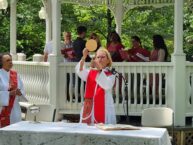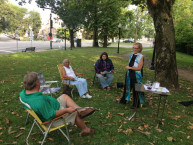May God’s words alone be spoken, may God’s words alone be heard. Amen.
Why is this night different than all other nights? That is a question our Jewish brothers and sisters asked earlier this week around the Seder table at the beginning of Passover. And we can ask it here now…
Why is this day different than all other days?
Because Mary said “I have seen the Lord!”
“I have seen the Lord!”
And we are forever changed.
Now, it doesn’t surprise me in the least that Mary Magdalene was one of the earliest winners of the coveted “golden halo” in Lent Madness. Now, as you all know by now, since we at Christ Church have been participating in Lent Madness, it is the Episcopal Church’s version of March Madness – but rather than a bracket of college basketball teams, ours was filled with saints of the church. From Dietrich Bonhoeffer to Charles Wesley, Saints battled it out through the “sweet sixteen of Saints” to the final four. And it was Mary Magdalene who walked away with the bragging rights back in 2010. And by the way…it was Charles – O for a thousand votes to sing – Wesley, the methodical Anglican hymn writer who has bragging rights this year. As a Drew Seminary alum, a Methodist seminary, I couldn’t be more proud.
Now one might think that sports have no place in the church, but, it truly does. You see, I know death and resurrection well… because I am a New York Mets fan. And, other than perhaps those Cubbies, there is no one who experiences the pain of a Met fan in the Fall. Yet every Opening Day – hope springs eternal – now that’s faith!
But let’s get back to our Gospel reading – a wonderful juxtaposition of contrasting stories. We have the part about Peter and the Beloved Disciple running to the empty tomb to check out Mary’s story about the body being gone from it. They are almost comical – one gets there first, doesn’t go in… the other passes him and goes in….not to be outdone, the other enters the tomb. Good grief. And, what do they do? They leave! It is said they believe, but it can’t be about the risen Christ or surely there would be no need for Mary to tell them, and one would think they would be leaping for joy at the news.
The men who came to check out Mary’s story and left did not encounter the risen Christ in the garden. They went to shutter themselves away, to hide from the world, and from themselves and their feelings. Jesus could have appeared to them… But, it was to her, to Mary, that he appeared. It is to Mary, the grieving one, the one who stayed, that Jesus first proclaims the good news of the resurrection. And it is Mary who is the first to tell of the good news – which is why she is often called “the apostle to the apostles.”
Through her grief, her darkest moment, her eyes are opened to new life. They say in twelve step programs one must hit bottom before a new life of recovery can take root. And in this gospel, Mary has hit rock bottom. She sat in that garden devoid of hope, weak with grief, her heart broken, her spirit despairing. I think many of us in our lives have felt as Mary did then. We experience all sorts of death – not only the loss of those we love, but spiritual and emotional pain and death that can come from our own life experiences.
And so often we want to rush folks out of grief, or move past it quickly ourselves. It makes us uncomfortable. But if we don’t walk though those times of darkness that happen to us, we can never fully appreciate the light that comes – the life that grows out of death. That is why, as I said often in the past few days, the journey through Holy Week is so important to experiencing Easter. You can’t have resurrection without death. To experience the resurrection we must first allow ourselves to die. To die to all that we think we know, all that we think is important, to our sense of ourselves as being the center our universe.
We often think of death as the end of life, but it is not. It is the beginning. In our day to day experiences, when we feel the darkness weighing us down, we need to allow the tears to come…and then we need to keep our eyes open. I was asked once as a chaplain by someone in emotional and spiritual pain “Where is God in all this?” God is with us in our pain, in our darkest night. In our deepest despair, Christ is standing with us in the garden, watching over us, and ready to be seen through our tears.
The gift of Easter is that darkness never has the last word. Life is stronger than death. We need only look through our tears to encounter resurrection.
Paul, in his letter to the Romans is spot on when he wrote: “Do you not know that all of us who have been baptized into Christ Jesus were baptized into his death? […] if we have been united with him in a death like his, we will certainly be united with him in a resurrection like his. […] We know that Christ, being raised from the dead, will never die again; death no longer has dominion over him.” But it also means, as St. Paul makes clear, that death has no dominion over us either.
In our baptism, we die with him, and are given new life in him.
Last night, as we do every Easter, we renewed our baptismal covenant. It is a reminder that in our baptism we died to all that would keep us from relationship with God in Christ, and were born again into a new life as a living part of the Body of Christ – here…now. In these vows, we renew our commitment to “seek and serve Christ in all persons, loving our neighbor as ourself, and striving for justice and peace among all peoples, respecting the dignity of every human being.”
Listen carefully to that vow:
“Seek and serve Christ in all persons”
Christ is! Not was – Christ IS!
This isn’t a story of something that happened once 2000 years ago! Christ lives in us, in all our brothers and sisters in this world. All we need do is open our eyes and look around us. Christ is alive, and because of this, resurrection is a continuous part of our lives.
And, as we have been doing here at Christ Church, it means that we encounter Christ in the world. We are called by our baptismal covenant to seek and serve Him. We cannot do that by thinking of church as something we do on Sundays, or only at Christmas and Easter. To be the body of Christ, to seek and to serve, we must break free of these walls – break free of all the walls that bind us. As we have been doing here with Ashes to Go, Stations of the Cross in Community, Worship Without Walls, and so much more – We must take the altar into the world – we must go out and encounter Christ in all others, loving them as he loved as.
We have good news to share – Christ is risen!
This does not mean we will not have darkness come into our lives – into our hearts. We will have moments of death and despair. It means that death has no dominion over us, as it doesn’t over him, because we are the body of Christ! We need not run away from grief, for it is in our tears, in our death, that we will come to new life. We always will have our eyes opened to the life that grows out of death, the light that overcomes darkness, because in baptism we were given new life in Christ, and in the Eucharist we are strengthened and renewed, and when we serve the Christ that is in all persons, we are given new life in him.
We are a resurrection people!
We are the body of Christ that is alive in the world then, now and always. A people ready to proclaim the good news –
“I have seen the Lord!”
The Lord is risen! He is risen indeed!
Alleluia! Alleluia!
[Please note: All sermons are as written, not necessarily as delivered on that Sunday]
The Rev. Diana Wilcox
Christ Church in Bloomfield & Glen Ridge
April 20, 2014
Easter Sunday – Year A
Hebrew – Ezekiel 37:1-14, etc.
Psalm – Psalm 98, etc.
Christian – Romans 6:3-11
Gospel – John 20:1-18






